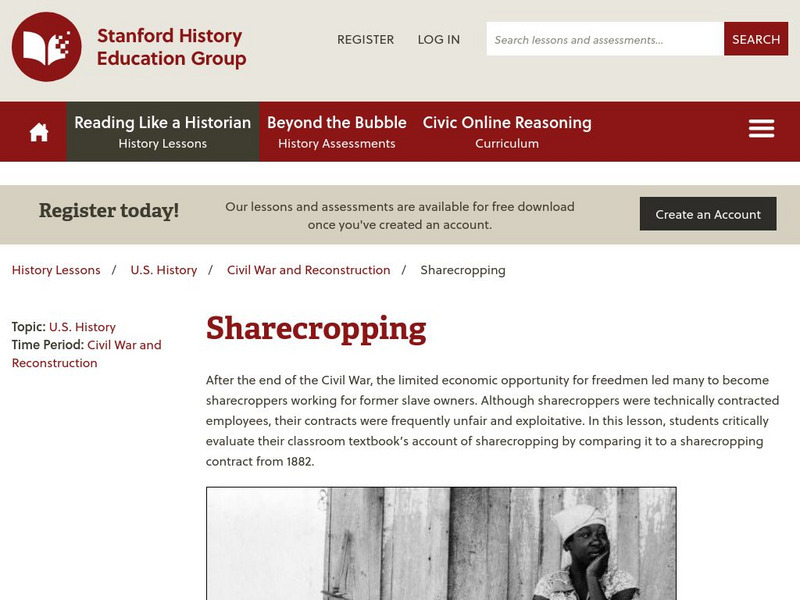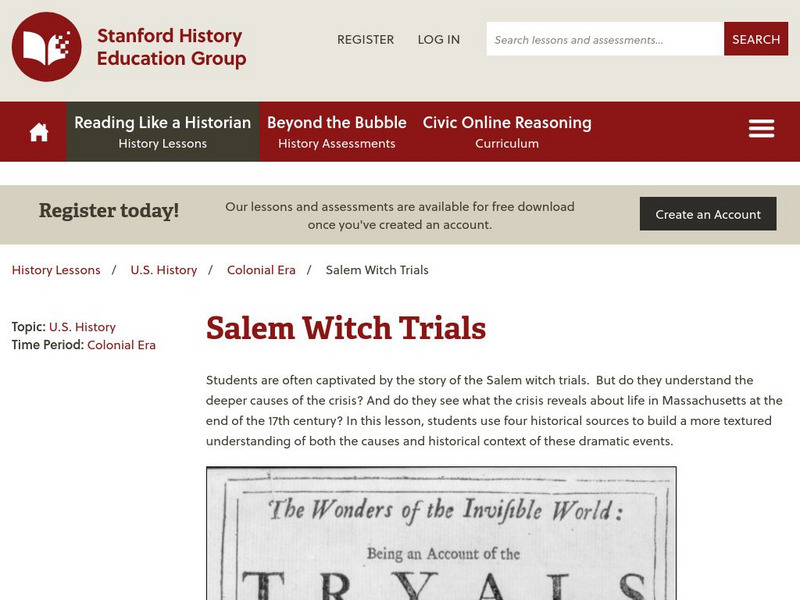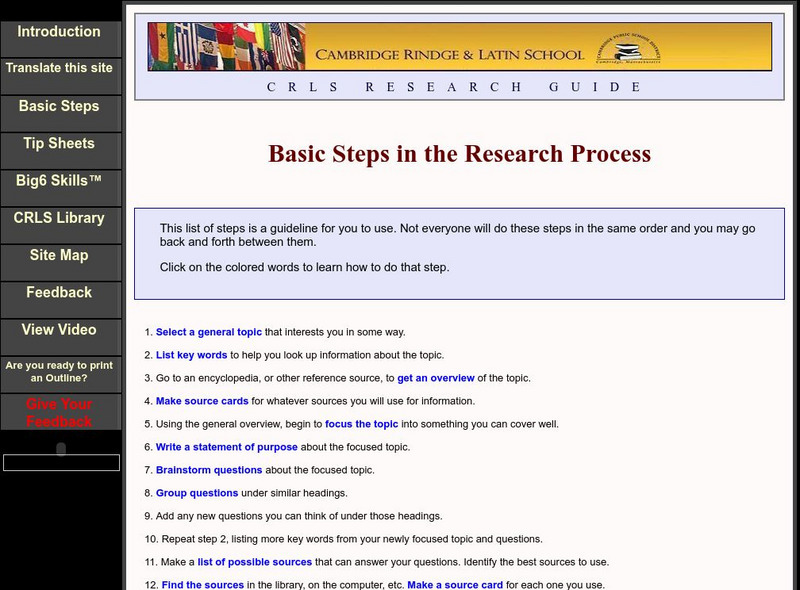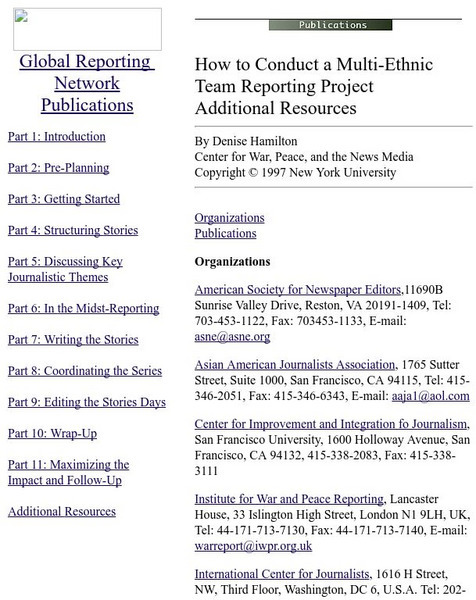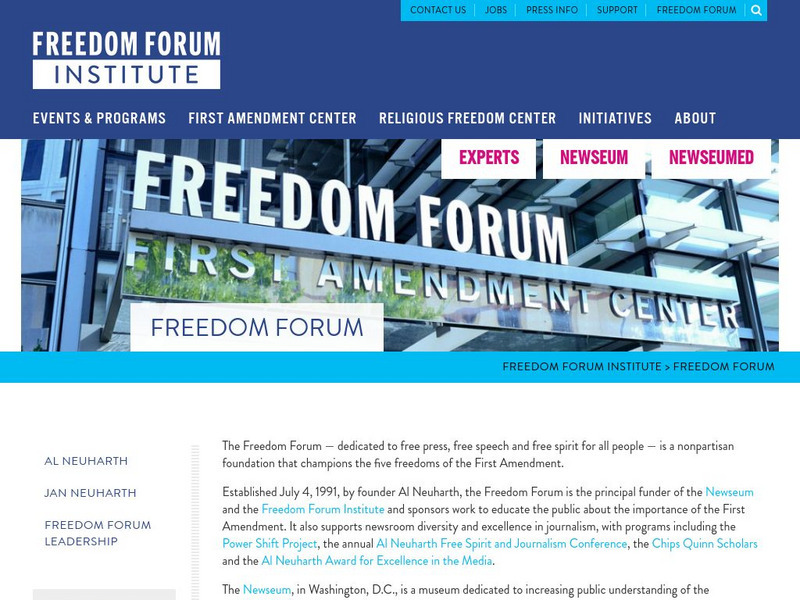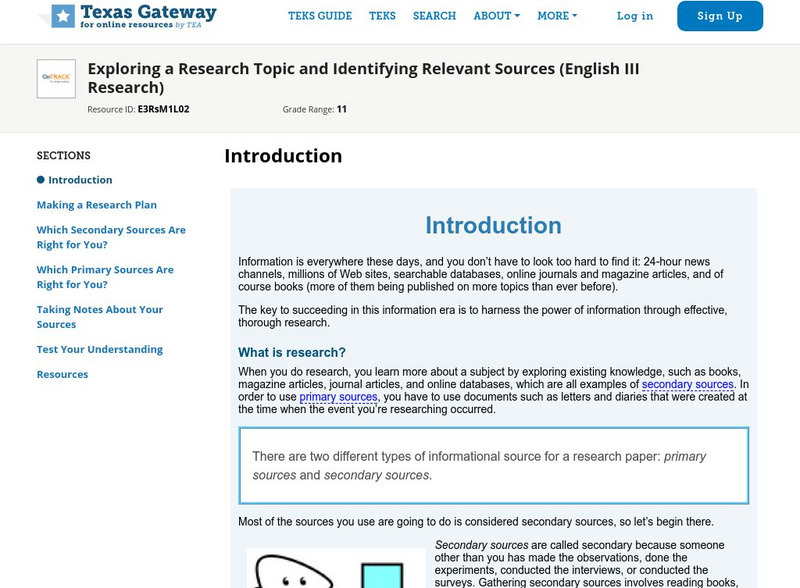Hi, what do you want to do?
Stanford University
Sheg: Document Based History: Reading Like a Historian: Sharecropping
[Free Registration/Login Required] Students solve a problem surrounding a historical question by reading primary source documents. This historical inquiry lesson allows students to critically evaluate their classroom textbook's account...
Stanford University
Sheg: Document Based History: Reading Like a Historian: Snapshot Autobiography
[Free Registration/Login Required] What is history? And why do historical accounts differ? In this lesson, students create brief autobiographies and then reflect on the process to better understand how history is written. Exploring these...
Stanford University
Sheg: Document Based History: Reading Like a Historian: Stamp Act
[Free Registration/Login Required] Students solve a problem surrounding a historical question by reading primary source documents. This historical inquiry lesson allows students to engage in key aspects of historical thinking as they...
Stanford University
Sheg: Document Based History: Reading Like a Historian:sourcing Classroom Poster
[Free Registration/Login Required] Sourcing asks students to consider who wrote a document as well as the circumstances of its creation. Who authored a given document? When? For what purpose? This poster reminds students before reading a...
Stanford University
Sheg: Document Based History: Reading Like a Historian: Salem Witch Trials
[Free Registration/Login Required] Students read primary source documents to solve a problem surrounding a historical question. This document-based inquiry lesson allows students to use four historical sources to build a more textured...
Stanford University
Sheg: Document Based History: Reading Like a Historian: Homestead Strike
[Free Registration/Login Required] Students solve a problem surrounding a historical question by reading primary source documents. This historical inquiry lesson plan allows students to use the historical thinking skills of...
Stanford University
Sheg: Document Based History: Reading Like a Historian: Maine Explosion
[Free Registration/Login Required] Young scholars solve a problem surrounding a historical question by reading primary source documents. When the USS Maine exploded in Havana Harbor, triggering the Spanish-American War, the New York...
Stanford University
Sheg: Document Based History: Reading Like a Historian: Political Bosses
[Free Registration/Login Required] Students use primary source documents to investigate central historical questions. In this investigation, students examine a political cartoon, a muckraker text, and the defense of a political boss to...
Library of Congress
Loc: 100 Years Ago Today
Search America's historic newspaper pages from 1836-1922 or use the U.S. Newspaper Directory to find information about American newspapers published between 1690-present. Chronicling America is sponsored jointly by the National Endowment...
Annenberg Foundation
Annenberg Learner: America's History in the Making: Historical Thinking Interactives
Six interactive activities are presented that walk students through how to use their critical thinking skills in the analysis of historical artifacts and documents. The sixth one explains how to balance the various perspectives that...
Cambridge Rindge & Latin School
Cambridge Rindge & Latin School: Basic Steps in the Research Process
A comprehensive list of the important steps in researching and writing a report or project. Includes links to tip sheets for each step.
University of California
Uc Irvine: Distinguishing Between Primary & Secondary Sources
This site has an online quiz to test your knowledge of primary and secondary sources.
Boston University
How to Conduct a Multi Ethnic Team Reporting Project
This site offers a phenomenal plan for assembling a culturally diverse journalism team to work on a story (or series of stories) of social significance. This extensive guideline provides step by step instructions. (Note: some links may...
Georgia Department of Education
Ga Virtual Learning: Nonfiction and Reseach: "Choosing Nonfiction Sources" [Pdf]
This is the 20-page PDF "Choosing Nonfiction Sources." It provides informatation about various types of nonfiction: primary and secondary sources, reference works, databases, newspapers and periodicals, and nonfiction books; it also...
University of North Carolina
University of North Carolina: Writing Center: Handouts: Evidence
What kinds of evidence best support the points you make in a paper? Where can you find the evidence you need? This handout answers all these questions and more, including the difference between primary and secondary sources. You'll also...
University of California
Uc Berkeley Library: Critical Evaluation of Resources
Questions to ask yourself when determining if a source is reliable. Discusses difference between primary and secondary source. List of reference sources and links to other sites that teach you how to evaluate sources....
Duke University
Duke University Libraries: Finding Primary Sources
Finding primary sources can be difficult and confusing at times. This site provides a list of history databases, rare books and manuscripts, and research guides for those looking for primary resources such as diaries, letters,...
Other
The Freedom Forum Online
This Freedom Forum site is dedicated to promoting a free press. Journalism education and "improving understanding between the media and the public" are a major focus. Budding journalists will enjoy this site. Includes links to news...
Virginia Tech
Digital History Reader: Introduction
An online learning module for the U.S. and European history. Presents central questions of key events in history. Students explore data, evaluate conflicting accounts or interpretations, and develop conclusions based on primary evidence....
Center for Innovation in Engineering and Science Education, Stevens Institute of Technology
Ciese: Historical Treasure Chests
After learning to distinguish between primary and secondary sources, students will examine four primary documents and address a set of questions for each.
University of California
University of California, Davis: The History Project
The History Project is a growing collection of lesson plans, teaching tools, digitized images, and documents for the teaching of history. Includes assignments for having students apply analytical skills to primary sources.
Other
The Archaeology Channel
A fascinating site offering a variety of podcasts which cover numerous locations around the world.
Texas Education Agency
Texas Gateway: Determining Validity and Reliability of Sources
This lesson will help students decide which sources are valid and reliable for supporting a thesis. It discusses how to evaluate books, articles, websites, and more.
Texas Education Agency
Texas Gateway: Exploring a Research Topic and Identifying Relevant Sources
In this lesson, students learn how to plan their research, find relevant primary and secondary sources, and use those sources in your research papers. W.11-12.8 Sources/Integrate/Cite





